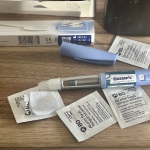Actavis Sued To Stop Forced Switch To New Alzheimer's Drug

Actavis, the world's third-largest generic drug manufacturer, has been sued by New York state to prevent it from forcing patients to take a new version of a popular Alzheimer's drug. The company is attempting to hook patients on an extended release version before its U.S. patent expires next year.
Alzheimer's disease, a common form of dementia, typically affects people over the age of 65. Patients initially experience short term memory loss, then longer term memory loss accompanied by anger and confusion, and eventually lose their bodily functions and die. Memantine is used to treat moderate to serious cases of Alzheimer's disease.
Memantine, which is marketed under the name Namenda, is administered twice a day at a cost of $300 a month per patient. Last June, Actavis began to market a new version called Namenda XR which only has to be taken once a day, at a cost of $285 a month per patient. The company has stopped the sale of the original drug in the hope that patients will not want to switch back.
The biggest difference between Namenda and Namenda XR is that the patent for the former expires in July 2015 while the patent for the latter will not expire till 2029. At the moment, Actavis brings in over $1.5 billion a year from the sale of the two drugs. (The company was founded in Illinois but moved to Ireland to reduce its tax payments)
Next year, other manufacturers will be able to sell memantine and prices could drop to a fifth of the current cost. Actavis has made it clear to financial analysts that it is attempting to hook patients on the new version as soon as possible to prevent losing a billion dollars in annual revenues.
"We believe that by potentially doing a forced switch, we will hold on to a large share of our base users," Brent Saunders, CEO of Actavis, said on a January conference call. "It's very difficult for the generics, then, to reverse commute back, at least with the existing (prescriptions). They don't have the sales force, they don't have the capabilities. Doesn't mean that it can't happen, it just becomes very difficult and is an obstacle that will allow us to, I think, go into a slow decline versus a complete cliff."
A transcript of Saunders' remarks was recently leaked to CBS News. "(This is) kind of equivalent to Apple introducing the iPhone 6 and then making all the iPhone 5s stop working," Ronny Gal, an analyst with Sanford C. Bernstein, told NBC News.
Patients reacted with fury. "They have no excuse whatsoever to stop making that drug available. None," Mike Hitch, a patient who has early onset dementia, told the television network. " I may have dementia and Alzheimer's and all that, but they're gonna make millions, billions of dollars off of it and get everybody switched to their XR version before they can even get hold of a generic."
On September 15, New York state brought a lawsuit against Actavis to prevent it stopping the sales of Namenda.
"A drug company manipulating vulnerable patients and forcing physicians to alter treatment plans unnecessarily, simply to protect corporate profits, is unethical and illegal," Eric Schneiderman, the New York State attorney general, said in a statement.
Actavis has refused to comment on the lawsuit. But the company has issued a statement on why it believes that the new drug is better: "We believe that the Namenda XR extended-release capsules have significant advantages over the twice-a-day Namenda tablets that are particularly meaningful for the Alzheimer's patient population and their caregivers."
- 182 Health



